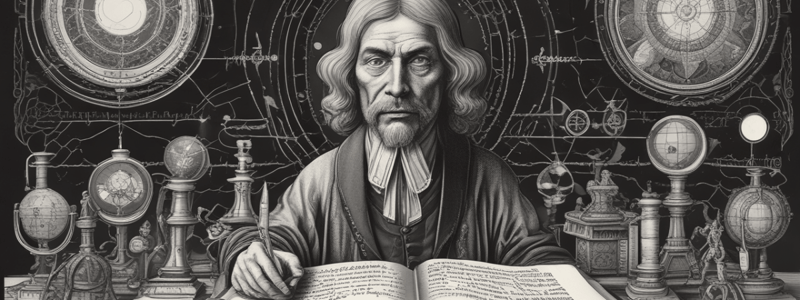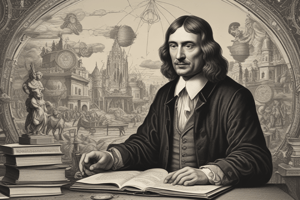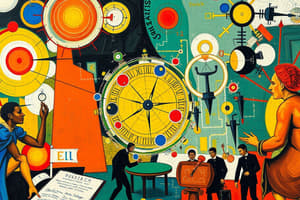Podcast
Questions and Answers
Who disproved many of Galen's assumptions about human anatomy and physiology?
Who disproved many of Galen's assumptions about human anatomy and physiology?
- Democritus
- Edward Jenner
- Robert Boyle
- Andreas Vesalius (correct)
Which scientist developed the smallpox vaccine in the 1700s?
Which scientist developed the smallpox vaccine in the 1700s?
- Edward Jenner (correct)
- Robert Boyle
- Democritus
- Andreas Vesalius
Who is known as the founder of modern chemistry?
Who is known as the founder of modern chemistry?
- Democritus
- Andreas Vesalius
- Robert Boyle (correct)
- Edward Jenner
Who replaced Aristotle's idea of the 4 elements with the concept of atoms?
Who replaced Aristotle's idea of the 4 elements with the concept of atoms?
What does 'Atomos' mean in Greek?
What does 'Atomos' mean in Greek?
Which scientist believed that everything is made up of much smaller particles called atoms?
Which scientist believed that everything is made up of much smaller particles called atoms?
'Boyle's Law' states that volume, air, and pressure affect each other. Who proposed this law?
'Boyle's Law' states that volume, air, and pressure affect each other. Who proposed this law?
'The Sceptical Chymist' (1661) is a work associated with which scientist?
'The Sceptical Chymist' (1661) is a work associated with which scientist?
'Atomos' is a term associated with the ideas of which ancient philosopher?
'Atomos' is a term associated with the ideas of which ancient philosopher?
'Atomos' was a term used to describe particles that were believed to be:
'Atomos' was a term used to describe particles that were believed to be:
Flashcards are hidden until you start studying
Study Notes
The Scientific Revolution
- The scientific method involves posing a question, forming a hypothesis, experimenting, and analyzing data to reach a conclusion or new hypothesis.
Francis Bacon and Rene Descartes
- Francis Bacon (1600s) advocated for inductive reasoning and empiricism, observing experiments and drawing conclusions.
- Rene Descartes used mathematics and reason, doubting everything until proven, and arrived at basic truths through strict reasoning.
- Descartes' famous quote is "I think, therefore I am," and he developed the Cartesian Plane.
Isaac Newton
- Isaac Newton (1643-1727) is considered the father of modern science.
- He created calculus and the Universal Laws of Gravitation, which state that every object is attracted to another based on their mass and distance.
- Newton's three laws are:
- An object stays at rest or in motion unless another force is exerted on it.
- F=MA (force equals mass times acceleration).
- For every action, there is an opposite and equal reaction.
Scientific Instruments
- Zacharias Janssen (1590) invented the microscope.
- Anton Van Leeuwenhoek (1674) observed bacteria and red blood cells using a microscope.
- Evangelista Torricelli (1643) developed the first barometer, measuring atmospheric pressure and weather.
Scientific Societies
- England established the Royal Society in 1660 to support scientific study.
- France established the Academy of Sciences in 1666.
Temperature Measurement
- Gabriel Fahrenheit (1714) used mercury in a glass to measure temperature, showing water freezing at 32 degrees.
- Anders Celsius (1742) developed a temperature scale where water freezes at 0 degrees.
The Human Body
- Scientists initially relied on Galen's work to understand human anatomy and physiology.
- Andreas Vesalius (1543) proved many of Galen's assumptions were wrong in his work, "On the structure of the human body".
- Edward Jenner developed the vaccine for smallpox in the 1700s, using cowpox to inoculate humans.
Chemistry and Atomic Theory
- Robert Boyle (1661) is considered the founder of modern chemistry, and wrote "The Sceptical Chymist".
- Boyle's Law states that volume, air, and pressure affect each other.
- Boyle replaced Aristotle's idea of 4 elements with the idea that everything is made up of smaller particles, atoms, an idea originally proposed by Democritus (460-370 BCE).
Studying That Suits You
Use AI to generate personalized quizzes and flashcards to suit your learning preferences.




